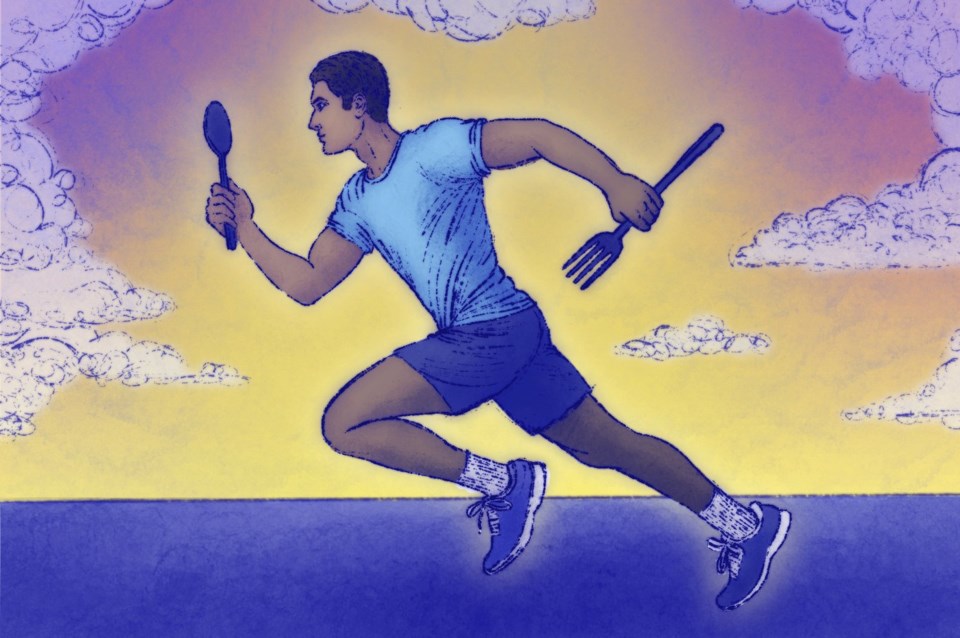If you listen to some self-proclaimed experts on social media, they swear that working out on an empty stomach burns more fat.
But it’s a common misconception that exercising in a fasted state improves performance or burns more calories, said Abby Langer, a dietitian in Toronto.
“The research shows that in terms of gains, it doesn’t really make much of a difference,” she said.
Does that mean you should load up on protein and carbs right before a workout? No, that’s not true either.
Here’s a look at when — and how — you should eat, before, after or even during a workout. (And remember, experts say is more important than when you eat.)
What’s the case for eating before exercising?
The calories in food literally are energy, so you need them to fuel your body for a proper workout. Eating too much too soon beforehand, though, can be problematic.
Exercising diverts blood from organs including the stomach to the muscles, said Langer, author of “Good Food, Bad Diet.” So exercising on a full stomach affects the digestive process, which could cause cramping or even make you feel sick.
That’s particularly the case with meals , which take longer to digest than carbohydrates. Langer recommends eating a high ratio of carbs beforehand and waiting two to three hours before intense exercise.
“You don’t want to eat a big steak an hour before you play hockey,” she said.
If you exercise first thing in the morning or before dinner, it’s OK to have a carb-rich snack like a banana with peanut butter or yogurt with fruit beforehand. It will give you the energy to perform well, and you can fuel up afterward with a full meal.
When — and what — should you eat after exercise?
That steak may serve you better afterward because that’s when a higher ratio of protein is easier to digest, said Krista Austin, a physiologist in Colorado Springs.
Austin said if it will be an hour or longer before you can have a full meal, it’s better to have a high-protein snack in the meantime to help curb your appetite. The reason has little to do with muscle recovery or nutrient absorption: Rather, people who are too hungry make poor dietary choices.
“A lot of people get very hungry about an hour after exercise, and you don’t want to do that,” said Austin, author of “Performance Nutrition: Applying the Science of Nutrient Timing.” “You want to catch it early, or you go and overeat.”
But it’s another myth that you need to grab a protein shake within minutes of finishing to build the biggest muscles, Langer said.
Many exercise enthusiasts point to what’s known as an “anabolic window” of about an hour within exercising that the body is primed to repair muscle. For the average person, you have a much longer window, and nutrient timing is less important than making sure you consume some protein at every meal, Langer said. The body needs a continuous supply of amino acids like protein for muscle repair and maintenance, she said, which means about 25 to 30 grams at every meal, depending on various factors.
“Prioritizing that will help with goals, either muscle building, satiety, weight loss, all of that,” Langer said.
How about eating during exercise?
Most people who are eating enough throughout the day don’t need anything during a workout. Langer and Austin said the threshold is about an hour of intense exercise. Longer than that — say you're training for a marathon — and you can benefit from a carb-rich snack in the middle.
Instead of focusing on when to eat, Austin said to focus on what and how much. She cautioned against overcomplicating the topic and recommended following the for a balanced diet.
“The biggest thing we need to teach people is that nutrition is simple,” she said. “Maybe you need to stop focusing on the concept of nutrient timing and just make sure that you’re consistently eating throughout the day and focus on health.”
EDITOR’S NOTE: Albert Stumm writes about wellness, food and travel. Find his work at https://www.albertstumm.com
Albert Stumm, The Associated Press




